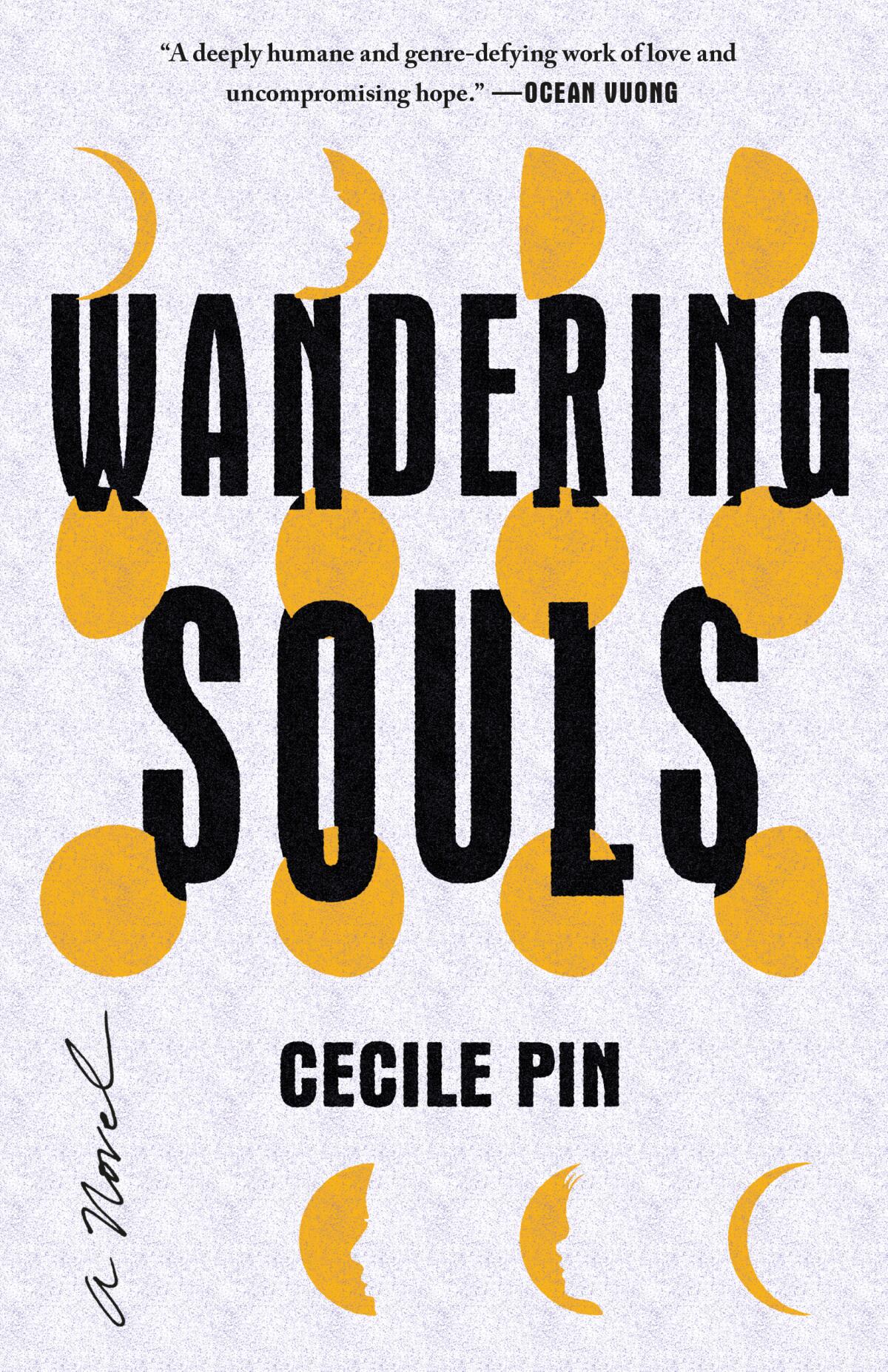The haunted journey of Vietnam’s “wandering souls,” in an intricate novel of refugee flight

- Share via
Review
Wandering Souls
By Cecile Pin
Henry Holt: 240 pages, $27
If you buy books linked on our site, The Times may earn a commission from Bookshop.org, whose fees support independent bookstores.
In the Vietnamese culture, if someone doesn’t receive a proper burial in their hometown, “their souls are cursed to wander the earth aimlessly, as ghosts.” This is according to an American soldier, explaining the macabre tactic of playing tapes of loud voices during the Vietnam War to terrify the enemy.
In “Wandering Souls,” Cecile Pin’s subtle and gripping debut novel, such Americans are bit players, as are the ghosts of those who die fleeing the country. The wanderers in question are Anh, Minh and Thanh, three young orphans who travel overseas, from one refugee camp to another, before finally beginning to piece together a life.
Pin movingly explores how their lives are shaped — and warped — by larger historical forces, and then how these lost souls struggle to move through denial and into some tentative form of acceptance.
The narrative begins in 1978, three years after the last American helicopter fled Saigon; the communists are hunting among their own countrymen for traitors, causing a mass exodus, a story line with obvious echoes in recent events in Afghanistan.
The Man of Two Faces returns in Viet Thanh Nguyen’s ‘The Committed.’ The author explains what’s different.
Straightforwardly written, the book seems almost deceptively simple at first, charting the departure of the three siblings — Anh is 16, Minh is 13 and Thanh is 10 — two weeks ahead of their parents and younger siblings, with the goal of getting to Hong Kong and eventually to a relative in the United States, where the promised land awaits.

But we view their departure with foreknowledge, which is far heavier than foreboding. The book’s devastating opening sentence reads, “There are the goodbyes and then the fishing out of the bodies — everything in between is speculation.”
After tragedy wipes out everyone in that second boat, the book becomes more intricately layered. As Anh tries to parent her brothers while navigating life in the refugee camp, Pin widens her scope. In addition to the American soldiers seen during and after the war, she incorporates news articles recounting real historical events, including attacks by rural fisherman in Thailand who captured and raped female refugees, and, later, Margaret Thatcher’s efforts to limit refugees while putting on a friendly face for political reasons. (Hundreds of thousands of Vietnamese “boat people” died trying to find safe harbor.)
There is also a literal wandering ghost: One of the family’s youngest siblings gives a first-person account from the limbo where their souls are stuck. The ghost chapters didn’t really work for me — for one thing, the voice is that of an adult and not a young child, and for another, I tend toward skepticism when the supernatural pokes into a narrative deeply grounded in realism. But as the book went on I realized it wasn’t really written for readers like me, but rather for those whose culture attunes them to the idea that death is a porous border.
Friends and family mourn Anthony Veasna So, whose highly anticipated debut story collection, “Afterparties,” brings refugee Stockton to life.
The novel is haunted and haunting, but it is not relentlessly grim. When the trio are finally preparing to leave Hong Kong for a new refugee camp in England, a Vietnamese man with a guitar plays Thanh a song in English symbolizing the hope that Pin threads throughout, with “lyrics Thanh could only partially understand, something about the sun coming.” He gives the boy a hurried education, playing snippets of “Yesterday” and “Hey Jude” before running back into his hut.
“He came back out with a piece of paper on which he had scribbled English words, some of which Thanh didn’t know the meaning of: ‘Pink Floyd’ and ‘Led Zeppelin’ and ‘Fleetwood Mac.’” Here are the seeds of Thanh’s eventual assimilation. It will be easiest for him as the youngest and most gregarious, but Anh will take solace in his transformation, feeling that her years of sacrifice were worthwhile.
There is one more layer Pin adds midway through. A first-person narrator enters to put much of the book — the real history and the fictional characters — in perspective, offering a sense of how intergenerational trauma can gradually heal itself.
“The truth is, I don’t want to write about death,” the narrator says by way of introduction. “... I want family feasts and Sunday outings, school choirs and afternoon naps. But instead, I rip open wounds I never knew I had.… I find photos of the war, of children lying dead in front of their burning houses, their ghostly visions following me day and night.”
Victor LaValle’s novel ‘Lone Women’ reinvents the western, adding horror and a Black woman pioneer protagonist — with help from the women in his own life.
The narrator says she can’t look away from all that she finds “not because I am drawn to the horrors but because I feel a visceral need to know them.
“Knowledge allows remembering and remembering is honoring,” she continues. “I want all the dead to be revered. I want monuments and statues and poems in their honor. I want podcasts and a ten-part docuseries. I want our own ‘Apocalypse Now.’”
Had Pin focused on the visceral horrors of the war itself, her first book might have caused people to turn away. But because she lets us live in the aftermath, we are inexorably pulled along, growing emotionally attached to Anh, Minh and Thanh, feeling an empathy and admiration for what these refugees endure, survive and achieve.
More to Read
Sign up for our Book Club newsletter
Get the latest news, events and more from the Los Angeles Times Book Club, and help us get L.A. reading and talking.
You may occasionally receive promotional content from the Los Angeles Times.












